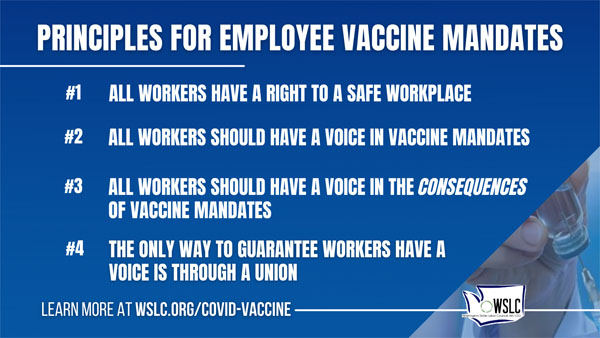NATIONAL
AFL-CIO on new COVID rules: Employers must step up
 WASHINGTON, D.C. (Nov. 4, 2021) — The AFL-CIO released the following statement Thursday from AFL-CIO President Liz Shuler regarding the White House vaccination and testing rules:
WASHINGTON, D.C. (Nov. 4, 2021) — The AFL-CIO released the following statement Thursday from AFL-CIO President Liz Shuler regarding the White House vaccination and testing rules:
“The Biden administration has made great strides to slow the spread of COVID-19. The Occupational Safety and Health Administration’s (OSHA’s) emergency temporary standard for health care workers, along with OSHA’s vaccination or testing and the Centers for Medicare & Medicaid Services’ vaccination rules, is a step in the right direction. However, with most of the country still experiencing high rates of COVID-19 transmission and as the Centers for Disease Control and Prevention has advised, we need a layered approach to stop the COVID-19 spread, particularly in indoor settings like workplaces.
“Vaccines must be coupled with workplace mitigation measures to reduce virus transmission—including improving ventilation, ensuring physical distancing, and providing paid leave when workers are infected and must quarantine. Working people must have a voice in how vaccination and testing policies are implemented. Importantly, the cost of keeping a workplace safe is the employer’s responsibility and should never fall on the worker. As this rule is implemented, we continue to call on the administration to make sure employers step up and meet their responsibilities to ensure workers are protected from COVID-19 exposures in the workplace.”

Here are the details of the new vaccine rules, as summarized by NPR:
Deadline is Jan. 4: The first rule, issued by the Occupational Safety and Health Administration, covers companies with 100 or more employees, applying to an estimated 84 million workers. Companies must ensure that their workers are either fully vaccinated against COVID-19 by Jan. 4 or that they test negative for COVID-19 at least once a week. The rule will take effect as soon as it’s published in the Federal Register.
Workers must get paid time off to get vaccinated: Under the OSHA rule, employers must pay workers for the time it takes to get vaccinated and provide sick leave for workers to recover from any side effects.
Employers don’t need to pay for testing: In a move that appears designed to push workers to choose vaccinations over testing, the rule does not require employers to pay for or provide testing to workers who decline the vaccine. However, collective bargaining agreements or other circumstances may dictate otherwise.
Unvaccinated people must wear masks: Unvaccinated workers must also wear face coverings while on the job.
Health care workers don’t have testing option under separate rule: A second rule issued by the Centers for Medicare & Medicaid Services requires some 17 million health care workers to be vaccinated by the same deadline, Jan. 4, but with no option for weekly testing in lieu of vaccination. The rule covers all employees — clinical and non-clinical — at about 76,000 health care facilities that receive federal funding from Medicare or Medicaid.
For more details, see the OSHA website.

The Washington State Labor Council, AFL-CIO, in consultation with its affiliated unions, has communicated a list of principles that Washington’s labor movement shares on employer COVID-19 vaccine mandates:
1) All workers have the right to a safe workplace.
2) All workers should have a voice in vaccine mandates.
3) All workers should also have a voice in the consequences of vaccine mandates.
4) The only way to guarantee that workers have a voice in vaccine mandates and their consequences is through the power of a union.
With these principles in mind, the WSLC will continue to encourage all union members to get informed about how safe and effective the vaccines are — and to get their shots. The council will also support its affiliated unions and their members as they navigate the effects of any layoffs on the essential work they do and the critical services they provide.
For more detailed information about these principles, click here.





